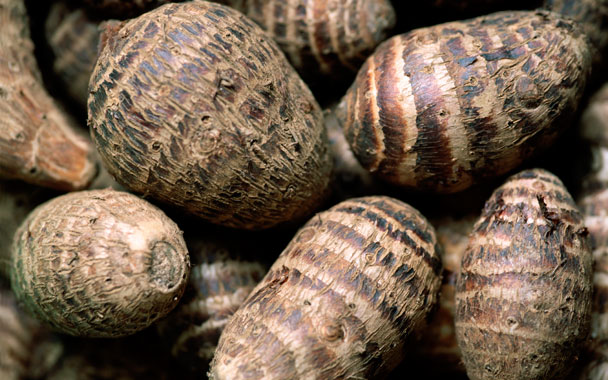It’s really not every day you go to your cute little local farmers market and hear one of the cute little farmers tell you a story about her menacing a woman with a piece of wood and yelling, “I will beat you so f****** bad. I will beat you so f****** bad!”
I’ve been hanging out with Lauren again, and once more she’s telling me about her spectacularly estranged husband. Or, to be precise, about her husband’s mistress. (Little good came of that encounter, in case you were wondering. )
Lauren is nothing if not rough and tumble, at least by her own telling. It’s not clear to me how we got on the subject of her chasing down her man’s girlfriend, but many of her stories come straight from the ramshackle little table she keeps, especially when you get to asking her about the plantains, the sorrel—the things she brings to the market that remind her of growing up in Barbados.
I picked up a few fist-sized pieces of taro—which she called eddo—and then confessed to her that, though I grew up loving the stuff, I didn’t know how to treat it. At first she did what most farmer/vendors do: told me how to boil or roast them, how to peel them while they’re hot so the skins just slip off. She suggested using it in beef stewed with garlic and onions, or chicken stewed with tomatoes, or pickled.
“Pickled?” I asked. How do you pickle something that’s essentially a potato?
She rattled off a recipe: 2 pints of water, 1 tablespoon of cider vinegar, 1 teaspoon of white vinegar, and 1 teaspoon of sugar. Boil the mixture with some onion, celery, and parsley, and dunk cooked eddo into it for an hour. She started smacking her lips and licking her fingers, bouncing her big frame in her chair, excited by the thought of pickled eddo.
Her face darkened. “Whatever you do, you have to make sure it’s fully cooked,” she said. “I ate it raw once when I was a girl.” Her eyes grew wild and terrified, and she pawed at her throat to show me how it felt. “It was like I got nettles in there!” she coughed. “I couldn’t even look at them for years.”
But then, 40 years ago, she was walking home from work down a knotty path, despite being six months pregnant. She caught her foot on a root, falling heavily to the ground. She lost her child. As she spoke, she mimed her memory of that moment, sticking her fingers in her mouth in an exaggerated motion, describing the scene in detached, awful detail.
While recovering, a doctor said that she needed to replenish her body by eating eddo soup. “The news hurt my heart,” she said. She forced herself to eat it, over and over, eventually discovering a taste for it. She talked about this in the most matter-of-fact way, but I wondered if it was because she learned to cook it fully before eating it, or if it was because she felt like she was getting her life back bowl by bowl.
I looked at the innocuous little pile of eddo. I looked at her table: a few bunches of herbs here, a pound of that there. That’s when I realized that every one of these things must have a story for her.
Just then a rickety old woman came over. “Where are these green beans from?” she asked.
“A box,” Lauren replied.


